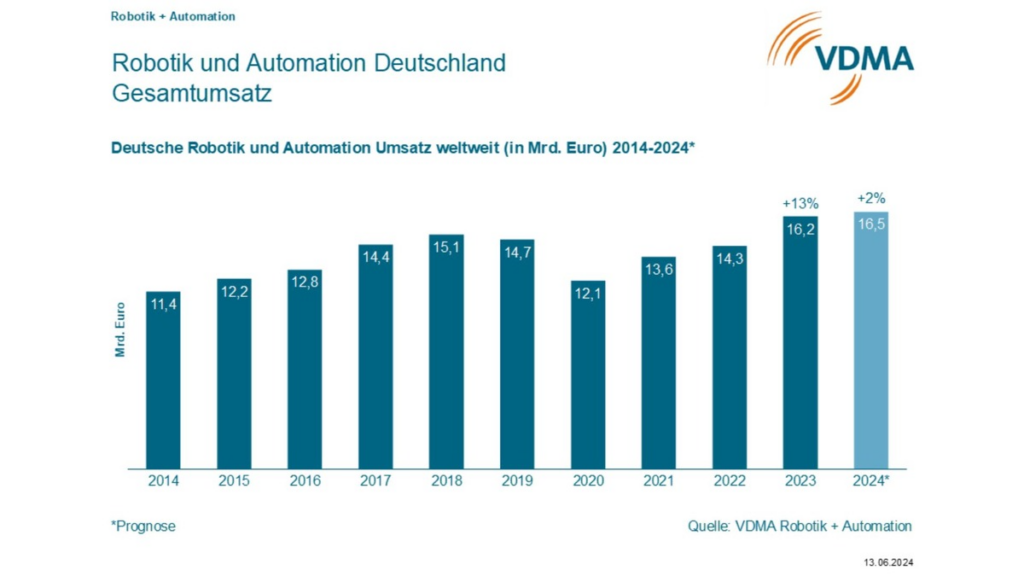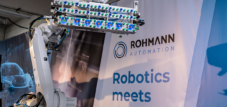German economy: Robotics and automation halves growth forecast – China sets its sights on Europe – Germany needs speed
Language selection 📢
Published on: July 9, 2024 / Update from: July 9, 2024 - Author: Konrad Wolfenstein

German economy: Robotics and automation halves growth forecast – China sets its sights on Europe – Germany needs speed – Image: Xpert.Digital
🌟 The German economy: challenges and opportunities in robotics and automation
🌍🚀 A stagnating domestic market and hopes abroad
The German economy is facing a challenge: robotics and automation, one of the key sectors for innovation and competitiveness, is showing signs of stagnation domestically. Despite a record year in 2023, in which sales rose by 13 percent to 16.2 billion euros, the industry is only forecasting moderate growth of 2 percent for 2024. Total sales should therefore reach 16.5 billion euros. This cautious forecast reflects customers' uncertainty and their reluctance to invest, which is closely linked to the subdued domestic economy.
Frank Konrad, Chairman of VDMA Robotics + Automation, emphasizes the need for better framework conditions to return the German economy to a solid growth path. “Uncertain customers are reluctant to invest,” explains Konrad, adding that impulses are expected next year primarily from abroad. In fact, orders received from abroad rose an impressive 21 percent in the first four months of 2024, underscoring the critical importance of international business.
🏭🔍 China as a growing competitor on the European market
A central factor that will shape the future development of the German robotics and automation industry is increasing competition from China. China is one of the world's leading nations in industrial automation and has made significant progress in recent years. Robot density in the manufacturing sector increased to 392 units per 10,000 workers, according to data from the International Federation of Robotics (IFR). This puts China almost on a par with Japan (397 units) and Germany (415 units).
The Chinese government is actively supporting this development through targeted measures as part of its five-year plans aimed at promoting a high-quality domestic robotics industry. The trade conflicts with the USA have also led to Chinese companies increasingly establishing local service and sales structures in Germany and the EU. This development presents the German industry with the challenge of asserting itself against a highly competitive and state-supported competitor.
🏛️📈 Necessary political measures and strategic decisions
“Politicians have recognized robotics and automation as key technologies for Germany’s competitiveness,” states Frank Konrad. “Now we need speed in implementation: Germany needs a reliable framework for investments and new impulses in order to strengthen competitiveness.”
The VDMA's 2028 strategy paper for robotics and automation offers important guidelines on this. The proposed measures include industrial policy measures to support the sector, the promotion of accelerated innovation, the training and promotion of talent and practical regulation. These aspects are crucial in order to secure Germany's technological leadership position and to continue to strengthen the industry's innovative strength.
A particularly important point is the promotion of talent. The shortage of skilled workers, particularly in the area of high technologies, represents a significant risk for further development. It is therefore necessary to start with training and to inspire young people for technical careers. This could happen, among other things, through increased cooperation between industry and educational institutions, practical training concepts and targeted funding programs.
🧠⚙️ Technological innovations as drivers of growth
Technological innovations play a central role in the competitiveness of the German robotics and automation industry. Rapid progress in areas such as artificial intelligence, machine learning and the networking of production systems (Industry 4.0) offers enormous potential. For example, the integration of AI technologies makes it possible to significantly increase the efficiency and flexibility of production processes. Predictive maintenance and intelligent control systems can minimize downtime and improve product quality.
The development of collaborative robots (cobots) that work safely and efficiently with human workers also opens up new application possibilities and market potential. These technologies could particularly help small and medium-sized companies (SMEs) to implement automation processes cost-effectively and thereby increase their competitiveness. It is crucial here that politics and industry work together to support technology transfer and quickly put innovations into practice.
🌐📊 Internationalization as a growth strategy
Given the challenges in the domestic market, the internationalization of German robotics and automation companies is a promising growth strategy. Markets outside Europe, particularly in Asia and North America, offer enormous growth opportunities. The high demand for automation solutions in these regions can be exploited through targeted expansion strategies and the development of local partnerships.
However, it is important to take cultural and regulatory characteristics of the target markets into account. Companies that want to operate successfully in international markets must adapt to specific conditions and requirements and invest in local know-how. This can be done by setting up regional offices, hiring local experts and collaborating with local partners. Such internationalization strategies not only strengthen the market position of German companies, but also contribute to the creation of new jobs and economic stability.
📌📝 Robotics and automation industry
The German robotics and automation industry is facing a challenging but also promising future. While the domestic market is characterized by uncertainty and reluctance to invest, the international market opens up significant growth opportunities. Increasing competition from China presents the industry with new challenges, but at the same time emphasizes the need for innovation and strategic change.
Through targeted political measures, the promotion of technological innovations, the expansion of practical training and a strong internationalization strategy, the German robotics and automation industry can sustainably secure its competitiveness. With a coordinated approach and the support of all stakeholders involved, Germany is ideally placed to continue to play a leading role in this key technology in the future and to further expand its economic strength.
📣 Similar topics
- 🤖 Challenges and opportunities for the German robotics industry
- 📉 Stagnant domestic market: How the industry is reacting to it
- 🌏 Internationalization: German robotics conquers new markets
- 🌱 Innovative power: The way out of the crisis for Germany's robotics
- 🏯 China as a competitor: strategies of German companies
- ⚙️ Political measures: Key to strengthening German robotics
- 📚 Training and talent development: basis for the future
- 🧩 AI and machine learning: paradigm shift in automation
- 🚀 International expansion: Success strategies of robotics companies
- 👩🏫 Cooperation with educational institutions: promoting talent of the future
#️⃣ Hashtags: #Robotics #Automation #Competitiveness #Internationalization #TechnologicalChange
Our recommendation: 🌍 Limitless reach 🔗 Networked 🌐 Multilingual 💪 Strong sales: 💡 Authentic with strategy 🚀 Innovation meets 🧠 Intuition
At a time when a company's digital presence determines its success, the challenge is how to make this presence authentic, individual and far-reaching. Xpert.Digital offers an innovative solution that positions itself as an intersection between an industry hub, a blog and a brand ambassador. It combines the advantages of communication and sales channels in a single platform and enables publication in 18 different languages. The cooperation with partner portals and the possibility of publishing articles on Google News and a press distribution list with around 8,000 journalists and readers maximize the reach and visibility of the content. This represents an essential factor in external sales & marketing (SMarketing).
More about it here:
🤖 Political measures: Key to strengthening German robotics
🚀 The robotics industry in Germany is one of the most promising technologies and plays a crucial role in the modernization of industry and society. Against this background, it is essential that politicians take targeted measures to promote the development and application of robotics solutions in the country. Through strategic funding, Germany can further expand its position as a leading nation in the field of robotics and secure a competitive advantage.
💸 Providing funding for research and development
One of the most important political measures to support robotics in Germany is the provision of funding for research and development (R&D). These funds enable companies and research institutions to realize innovative projects and develop new technologies. It is critical that the federal government demonstrates a long-term commitment to funding R&D in robotics to ensure continued progress and a stable innovation landscape. Focusing on areas such as artificial intelligence (AI), machine learning and autonomous systems can be particularly valuable as these technologies form the basis for many modern robotics solutions.
📚 Improving educational infrastructure
Another central element for strengthening German robotics is improving the educational infrastructure. The shortage of qualified specialists in the field of robotics and automation represents a significant challenge. Comprehensive education and training programs are needed to attract young talent and equip existing workers for the challenges of the future. This includes the promotion of MINT subjects (mathematics, computer science, natural sciences and technology) as well as the integration of specialized robotics courses and programs in schools, universities and vocational training centers.
🏢 Strengthening cooperation between industry and science
Cooperation between industry and science must also be strengthened. The creation of innovation centers and clusters in which companies and research institutions can work together on projects is of great importance. Such networks enable the exchange of knowledge and technologies and thus promote the emergence of new solutions and applications. By supporting this collaboration, politicians can create fertile ground for groundbreaking innovations and increase the competitiveness of the German robotics industry.
⚖️ Adjustment of legal framework conditions
Another crucial factor is the adaptation of the legal framework to the requirements of modern robotics. The rapid progress in this area poses new challenges for legislation, particularly in relation to liability, security and data protection. Clear and flexible regulations are necessary to promote innovation while ensuring the protection of citizens. Politicians should work closely with experts and stakeholders from industry to formulate practical and future-oriented laws.
🌍 International collaborations and research
Germany can also benefit from international cooperation. Technological progress does not stop at national borders, and exchanges with leading robotics nations such as Japan, South Korea and the USA can provide valuable inspiration. International partnerships and research collaborations can provide access to new technologies and markets, allowing German companies to strengthen their global presence.
♻️ Promoting sustainable and ethical robotics solutions
The importance of sustainable and ethical robotics solutions should also not be underestimated. Politicians should ensure that developments in robotics are always in line with ecological and social standards. This can be achieved through targeted funding of projects that aim, for example, at energy efficiency, recycling options and humane working conditions. This means that Germany can be a leader in robotics not only technologically but also morally.
📢 Promote social acceptance
In order to promote social acceptance of robotics, transparent and open communication is also necessary. It is important to educate the population about the benefits and possible effects of robotics and thus reduce any fears and prejudices that may exist. This can be done through high-profile campaigns, information events and dialogue with citizens. An informed and enlightened society is more willing to support and actively use technological advances.
🏭 Supporting small and medium-sized enterprises (SMEs)
In addition to supporting large companies, politicians should also keep an eye on small and medium-sized enterprises (SMEs). These companies play a central role in the German economy and often have the potential for innovative and specialized robotics solutions. Through targeted funding programs and advice, SMEs can be supported in implementing new technologies and increasing their competitiveness.
🌟 Promoting international competitiveness
Last but not least, the international competitiveness of German robotics must be promoted. By promoting exports and supporting the development of new markets, politicians can help ensure that German robotics companies are also successful outside of Europe. This not only strengthens the economy, but also contributes to German know-how being recognized worldwide.
🚀 Robotics in Germany
Strengthening German robotics requires a variety of political measures. From providing funding for R&D to improving educational infrastructure to adapting legal frameworks and international cooperation - all of these steps are necessary to position Germany as a leading nation in the field of robotics. A well-thought-out and comprehensive policy can help ensure that robotics in Germany not only enables technological advances, but also makes a positive contribution to the economy and society.
📣 Similar topics
- 🤖 Importance of political measures for German robotics
- 💡 Promotion and development in robotics
- 📚 Improving educational infrastructure in the robotics field
- 🌐 Strengthen cooperation between industry and science
- ⚖️ Adapt the legal framework for modern robotics
- 🌍 Promote international collaboration and partnerships
- 🦾 Develop sustainable robotics solutions
- 🔍 Transparent communication for social acceptance
- 🏭 Supporting small and medium-sized robotics companies
- 🌟 Strengthen the competitiveness of German robotics internationally
#️⃣ Hashtags: #robotics #technologypromotion #education #cooperation #legislation
We are there for you - advice - planning - implementation - project management
☑️ SME support in strategy, consulting, planning and implementation
☑️ Creation or realignment of the digital strategy and digitalization
☑️ Expansion and optimization of international sales processes
☑️ Global & Digital B2B trading platforms
☑️ Pioneer Business Development
I would be happy to serve as your personal advisor.
You can contact me by filling out the contact form below or simply call me on +49 89 89 674 804 (Munich) .
I'm looking forward to our joint project.
Xpert.Digital - Konrad Wolfenstein
Xpert.Digital is a hub for industry with a focus on digitalization, mechanical engineering, logistics/intralogistics and photovoltaics.
With our 360° business development solution, we support well-known companies from new business to after sales.
Market intelligence, smarketing, marketing automation, content development, PR, mail campaigns, personalized social media and lead nurturing are part of our digital tools.
You can find out more at: www.xpert.digital - www.xpert.solar - www.xpert.plus




























